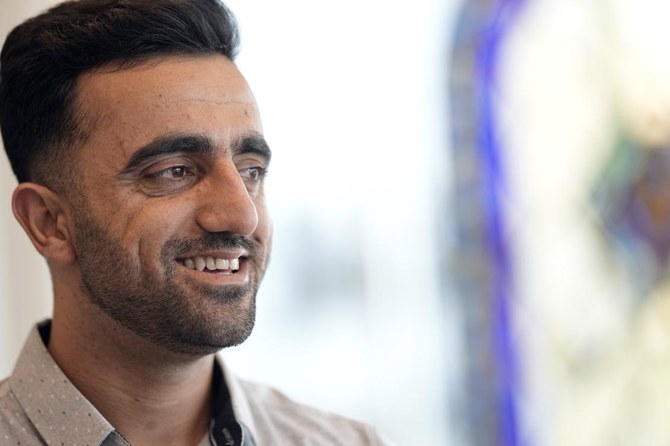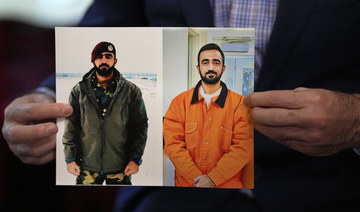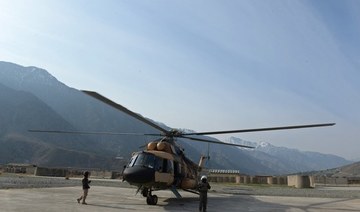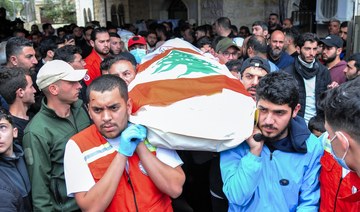HOUSTON: An Afghan soldier who fled the Taliban and traveled through nearly a dozen countries before being arrested at the Texas-Mexico border and detained for months has been granted asylum, allowing him to remain in the United States, his brother said Wednesday.
Abdul Wasi Safi, 27, is one of tens of thousands of Afghan citizens who fled to the US following the withdrawal of its forces from Afghanistan in August 2021.
The soldier, called Wasi by family and friends, and his older brother, Sami Safi, worried that if Wasi Safi wasn’t granted asylum, he could be sent back to Afghanistan, where he would likely be killed by the Taliban because he had worked with the US military.
But Wasi Safi’s lawyer surprised the brothers Tuesday with news that his asylum request had been granted. The brothers, who live in Houston, had thought a decision wasn’t coming until a Nov. 19 court hearing.
“I have tears of joy in my eyes,” Sami Safi said. “Now he can live here. Now he can be safe here.”
The US Department of Justice’s Executive Office for Immigration Review, which handles immigration cases, didn’t immediately reply to an email seeking comment about Wasi Safi being granted asylum, which was first reported by the Military Times.
An intelligence officer for the Afghan National Security Forces, Wasi Safi made his way to Brazil last year. Last summer, he started a months-long journey on foot and by boat through raging rivers and dense jungle to the US, crossing 10 countries on his treacherous trek.
At the US-Mexico border near Eagle Pass, Texas, Wasi Safi was arrested in September 2022 and spent several months in detention before being freed following intervention by lawyers and lawmakers.
Those working on Wasi Safi’s case say it highlights how America’s chaotic military withdrawal from Afghanistan continues to harm Afghan citizens who helped the US but were left behind.
Nearly 90,000 Afghans who worked with American soldiers as translators or in other capacities since 2001 have arrived in the US on military planes since the chaotic withdrawal, according to the US Department of Homeland Security. The Afghan Adjustment Act, a proposed law to streamline their immigration process, has stalled in Congress.
Other Afghans, like Wasi Safi, made their way to the US on their own.
“This was supposed to happen because if you give so much sacrifice to a country’s government, to a country’s military who promised you ‘we will never leave our allies behind,’ it was the right thing for the government to do,” said Sami Safi, 30, who was a translator for the US military and has lived in Houston since 2015.
Wasi Safi’s unresolved immigration status had meant that he wasn’t authorized to work. By getting asylum, he will be able to apply for a work permit.
His brother said it will also help him focus on getting treatment for injuries he suffered during his journey to the US A brutal beating by police officers in Panama severely damaged his teeth and jaw and left him with permanent hearing loss.
Sami Safi said getting his brother asylum is part of an effort that he hopes one day leads to bringing their parents and other siblings to the US They continue facing threats in Afghanistan over Wasi Safi’s work with the US military, Sami Safi said.
“They were full of joy after hearing about my brother. And we’re just only hoping and praying that we get to see them, we get to bring them here, so that my brothers and my sisters can pursue happiness and live a peaceful life,” he said.
Afghan soldier who was arrested at US-Mexico border after fleeing Taliban is granted asylum
https://arab.news/9gxn4
Afghan soldier who was arrested at US-Mexico border after fleeing Taliban is granted asylum

- Wasi Safi’s lawyer surprised the brothers Tuesday with news that his asylum request had been granted
- The brothers, who live in Houston, had thought a decision wasn’t coming until a Nov. 19 court hearing
US university apologizes after contractors spray paint in faces of pro-Palestine protesters

LONDON: The president of a Cleveland university in the US state of Ohio has apologized to students after hired contractors sprayed pro-Palestinian demonstrators in the face earlier this week while attempting to cover up a mural, local media has reported.
Students at Case Western Reserve University painted the Advocacy and Spirit walls on Monday night with the Palestinian flag and messages that included “I dream of breaking the siege,” “Come together in peace” and the number of Palestinian children killed in Gaza since war between Israel and Hamas broke out in October, Cleveland.com said.
Prompted by an unprecedented attack by Hamas on Oct. 7, Israel retaliated with an offensive that has so far killed almost 35,000 people in Gaza, mostly women and children, according to the territory’s health ministry.
A video showed the students, who are accusing the contractors of assault, trying to block the contractors from painting over the wall by standing in front of it, and one student wearing a face shield, was seen completely covered in white paint.
The video was shared by the Plain Dealer and Cleveland.com by Case’s Students for Justice in Palestine group.
The contractors had been hired by the university’s president, Eric Kaler, early on Tuesday because “the administration said the messaging was ‘threatening, intimidating and antisemitic,’” Cleveland.com said, adding that he later released a statement apologizing to the community for the incident, saying he was “disturbed by what occurred.”
He added: “Let me be clear: No students — or any individuals — should ever be treated this way, especially on a campus where our core values center on providing a safe, welcoming environment. This is not who we are as an institution, and I am deeply sorry this ever occurred.”
Palestinian-Ameican student, Ameer Alkayali, 18, who was seen being completely sprayed in the video, said: “I stood against the wall, and the painters asked ‘Should we continue?’ The cops showed general confusion and didn’t tell them to stop. So, as seen in the video, they continue to just paint right over us.
“They told us to not put our hands in front of the machine because it’s dangerous. And we put our hands up, and they still continued to paint on our hands and sprayed us with it?”
Alkayali, who has been protesting with Case students sine they set up their encampment last week has also previously been detained and released by local police and now says “plans to take legal action against Case’s administration and its public safety department,” Cleveland.com reported.
“We were coughing, and it didn’t come out of my skin for hours,” he said. “Like it’s still in my hair. I can see it under my nails, and there was no sort of medical or any assistance with the situation after from Case or local police.”
Case said it was investigating the incident and since then, the wall has been painted over with a pro-Israeli message, saying: “They call for intifada so we call them terrorists.”
“Kaler said the college will ‘hold individuals responsible for this behavior, including the failure of our own officers to intervene,’” Cleveland.com said.
On Wednesday, “Cleveland Mayor Justin Bibb and the city’s police chief, Annie Todd, urged Kaler and his administration to think of the students’ rights,” the news outlet said.
“We support 1st Amendment rights and implore CWRU leadership to consider this and think about how the decisions they make and the actions they take – especially against those who are abiding by the law – will influence some of the progress we have collectively made as a city. At the same time, we urge individuals to demonstrate peacefully,” Bibb and Todd said.
Sit-ins and demonstrations demanding an end to the Israeli war on the Gaza Strip continued to spread across several American and European universities, while local media reported that US police have arrested or detained more than 2,400 students who participated in protests in support of Palestine.
Thousands of pro-Palestinian protesters rally in Madrid

- Spain is one of Israel’s harshest critics in Europe and leading efforts to recognize a Palestinian state
MADRID: Thousands of pro-Palestinian demonstrators marched through Madrid on Saturday to demand a ceasefire in war-torn Gaza and a severing of ties between Spain and Israel.
Numbering around 4,000 according to the authorities, protesters held up banners and signs condemning a “genocide” in Gaza and lauding the “resistance” of the Palestinian people.
Palestinians have been “crammed” in southern Gaza and “now they are displaced again from one place to another while there are no more safe places,” said 57-year-old Jaldia Abubakra, referring to Israeli evacuation orders in the city of Rafah.
Around 30 organizations called for the rally before the 76th anniversary of what Palestinians call the “Nakba” (“catastrophe“), when 760,000 people fled their homes during the 1948 war that accompanied Israel’s creation.
Spanish students have set up peaceful sit-ins and camps at universities in Madrid, Barcelona and Valencia in recent days, mirroring similar pro-Palestinian campus movements across the United States and Europe.
Earlier this week, Spanish universities expressed willingness to suspend ties with any Israeli educational institution that failed to express “a clear commitment to peace.”
Spain is one of Israel’s harshest critics in Europe and leading efforts to recognize a Palestinian state.
The Gaza war started with Hamas’s unprecedented October 7 attack on Israel, which resulted in the deaths of more than 1,170 people, mostly civilians, according to an AFP tally of Israeli official figures.
Militants also seized hostages, of whom Israel estimates 128 remain in Gaza, at least 36 of whom the military says are dead.
Israel’s retaliatory offensive has killed at least 34,971 people in Gaza, mostly women and children, according to the Hamas-run territory’s health ministry.
Germany urged to explain Schengen ban on British Palestinian academic

- Dr. Ghassan Abu-Sittah, who has been volunteering in Gaza hospitals, was blocked entry to Germany and France in recent weeks
LONDON: A human rights group has urged Germany’s government to publicly announce if it has imposed a Schengen-wide entry ban on a British Palestinian surgeon and academic.
Dr. Ghassan Abu-Sittah, who has been volunteering in Gaza hospitals, was blocked entry to Germany and France in recent weeks and, on Thursday, Dutch officials told Palestine’s ambassador to the Netherlands he would not be allowed to enter the country for an event at the Palestinian Embassy in The Hague on May 15.
When blocked from entering France last Saturday, Abu-Sittah was placed in a holding zone at Charles de Gaulle airport before being expelled, according to French Sen. Raymonde Poncet Monge, who had invited him to speak at the senate.
Abu-Sittah posted to social media and told Human Rights Watch that French authorities at the airport had informed him he was barred due to a year-long ban imposed by Germany, without his knowledge.
A French official told the Associated Press that the German ban would be applied across the entire 29-country Schengen area.
“Dr. Abu-Sittah has seen firsthand the atrocities taking place in Gaza,” said Yasmine Ahmed, UK director at Human Rights Watch. “Germany should immediately explain why it has denied him entry and imposed this far-reaching ban on a leading health professional to speak in Berlin, Paris and The Hague about what he witnessed in Gaza.”
The prevention of Abu-Sittah from sharing his experience of treating patients in Gaza amid the Israel-Hamas war ravaging the enclave risked “undermining Germany’s commitment to protect and facilitate freedom of expression, and assembly and to nondiscrimination,” HRW said.
HRW also urged the UK and Scottish governments to push Germany into explaining Abu-Sittah’s Schengen-wide visa ban.
“In the midst of ongoing atrocities in Gaza, countries should be prioritizing ending complicity and promoting accountability,” Ahmed said. “Instead, Germany, in blocking Dr. Abu-Sittah from sharing his experience, is trying to block citizens from even hearing about the grave abuses taking place in Gaza. The UK government should immediately raise the reported ban with their German counterparts.”
Iraqi people smuggler who sent thousands across English Channel tracked down by BBC

- A BBC report released on Friday revealed how the organization tracked Majeed down and carried an interview with the fugitive
LONDON: A crime boss wanted in several countries for his role in the smuggling of an estimated 10,000 migrants across the English Channel has been tracked down, according to reports in the British media.
Iraqi Kurd Barzan Kamal Majeed, nicknamed “Scorpion” because of his WhatsApp avatar, had been missing since failing to appear in court in Belgium for a sentencing hearing in November 2022.
The UK’s National Crime Agency issued a warrant for his arrest that same year. Majeed had moved to the British city of Nottingham in 2013, but had been deported two years later.
A BBC report released on Friday revealed how the organization tracked Majeed down and carried an interview with the fugitive.
Rob Lawrie, a former soldier who now works with refugee support agencies, assisted the investigation, which tracked Majeed to his home in the Kurdistan city of Sulaymaniyah, close to the border with Iran.
During the interview, Majeed said he had lost count of the number of people he had helped smuggle and admitted that between 2016 and 2019 he was one of two people running a people-smuggling operation in Belgium and France.
However, he denied being the boss of the operation, adding: “A couple of people, when they get arrested, they say: ‘We’re working for him.’ They want to get less (of a) sentence.”
Majeed’s accomplice, Nzar Jabar Mohamad, was given a 10-year prison sentence at a British court in Oct. 2021 after admitting to attempting to bring 21 migrants into the UK.
He also denied culpability for the death of migrants who attempted the crossing, claiming he was merely a “money man” who “just took the money and booked places.” He added: “I never put anybody in a boat and I never killed anybody. Nobody forced them. They wanted to, they were begging the smugglers: ‘Please, please do this for us.’”
His profits from the operation, with some estimates putting the price of a crossing at £6,000 ($7,514) per person, enabled Majeed to purchase a villa in Marmaris in Turkiye, according to the local police
According to government figures, more than 9,000 migrants have crossed the English Channel in small boats so far this year, a 15-percent rise on the same period in 2022, which was a record-breaking year in which more than 45,700 migrants arrived.
In his interview with the BBC, Majeed claimed that some of his former co-smugglers were still operating today and that a few had even been granted British passports.
“In three days, one guy sent 170 or 180 people from Turkey to Italy, still holding a British passport. I want to go to some other country to do business. I can’t.”
Ann Lukowiak, a public prosecutor in Belgium who was part of the team that worked on convicting Scorpion, told the BBC she still hopes Majeed will be extradited from Iraq to face justice one day.
“It’s important to us to have sent the signal that you can’t do what you want,” she said. “We will eventually take him down.”
Modi critic joins India’s election campaign on bail

- Top court allows Delhi Chief Minister Arvind Kejriwal to leave custody until June 1
- His release is expected to give a boost to India’s opposition alliance in ongoing polls
NEW DELHI: Delhi Chief Minister Arvind Kejriwal joined India’s ongoing general election — boosting the opposition alliance on Saturday — a day after the Supreme Court ordered his temporary release on bail in a controversial graft case.
A fierce critic of Prime Minister Narendra Modi and the leader of the Aam Aadmi Party, Kejriwal was arrested in late March, in connection with corruption allegations related to the excise policy of the Delhi government led by him. He denies the accusations.
On Friday, the top court granted Kejriwal 21-day interim bail to campaign in the seven-phase general vote, which started on April 19. He has to surrender after the last day of voting on June 1.
“I will go around the country in the next 21 days to stop this dictatorship of Modi,” Kejriwal said at a conference in Delhi.
“After June 4, there will be no Modi government. In all states, their seats are going down and they will not get more than 220 to 230 seats.”
The results of the world’s largest election are set to be announced on June 4. The party or coalition that wins at least 272 of the 543 contested seats in the lower house of parliament will form the government.
Seeking a third straight term in office, Modi has been targeting 400 seats for the National Democratic Alliance led by his Hindu nationalist Bharatiya Janata Party, which has been in power since 2014.
He is challenged by an alliance of two dozen opposition parties, the Indian National Developmental Inclusive Alliance, or INDIA, of which Kejriwal’s AAP is a part.
Kejriwal has accused Modi and his BJP of damaging democracy, and abusing power and the constitution.
“The opposition’s morale will get a further boost,” said Satish Kumar Singh, a political analyst in Delhi.
“The release of Kejriwal further reinforces the opposition campaign on the need to save democracy and maintain fairness in the electoral process.”
Kejriwal’s AAP is a challenger to the BJP in Delhi and Punjab, where voting will take place on May 25 and June 1 respectively.
“Kejriwal’s release is a boost to the cadres of the AAP and the opposition alliance at this crucial time when the opposition alliance is challenging the dominance of the BJP in the capital city,” Andalib Akhtar, a New Delhi-based commentator and editor of The Indian Awaz, told Arab News.
“It’s good that the court has taken a decision in favor of democracy and is giving the opposition leader — who was arrested just on the eve of the general elections — an opportunity to be on an equal footing democratically.”






















